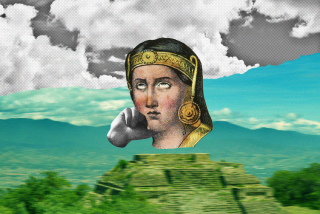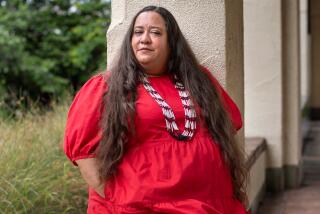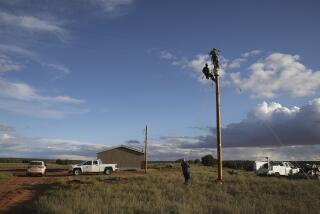Columbus’ Arrival Began Epoch of Death, Says Native American
On the 502nd anniversary of the arrival of Christopher Columbus, John Funmaker, a Native American from the Winnebago tribe, told 200 people in San Pedro Wednesday that the day marked the beginning of an epoch of death and destruction of native people.
Funmaker urged President Clinton to publicly concede that the United States committed systematic acts of genocide against Funmaker’s Native American forefathers.
Native Americans still are struggling to find their identity and regain their dignity in a country whose classrooms continue to teach a lie, said Funmaker, who is executive director of Iron Circle Nation, an organization representing about 50 tribes.
And he declared that from now on, Iron Circle Nation--established in Southern California six years ago--will recognize Columbus Day as Native American Truth Day.
“Iron Circle Nation pledges to continuously expound the truth worldwide, that the bodies of our ancestors were silenced in bloodshed and ‘America the Beautiful’ committed a genocide of our people, from sea to shining sea,” he said.
His remarks were made in a ceremonial circle on a cliff at Angels Gate in San Pedro, kicking off an annual five-day Gathering of the Elders.
“We’re not bashing Columbus,” Funmaker said. “We just want to get a positive message out that despite the genocidal practices on our people, we have survived and we have something to offer.”
The gathering was a spiritual celebration of nature and the land, demonstrated with several rituals and an Aztec dance by the group Cacheauto.
The thudding of drums and dancers’ feet represented the heartbeat of the Earth.
Elders from the Gabrieleno tribe, whose members were among the earliest inhabitants of Southern California, spoke of the need for people of all races to come together.
“We are all from Mother Earth. It doesn’t matter what color you are or what language you speak,” said Chief Vera Rocha.
The proceedings were watched by a crowd of fellow Native Americans, African Americans, Asians and whites.
Also at the gathering were several elders from Big Mountain, the Navajo reservation in Arizona where Native Americans continue to fight a government-ordered relocation of thousands of families resulting from a 1974 partitioning of reservation land.
More to Read
Sign up for Essential California
The most important California stories and recommendations in your inbox every morning.
You may occasionally receive promotional content from the Los Angeles Times.









